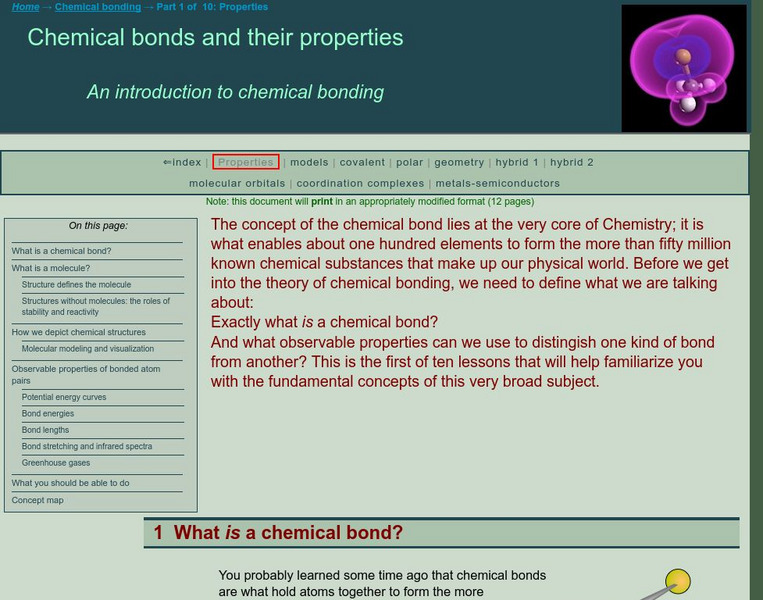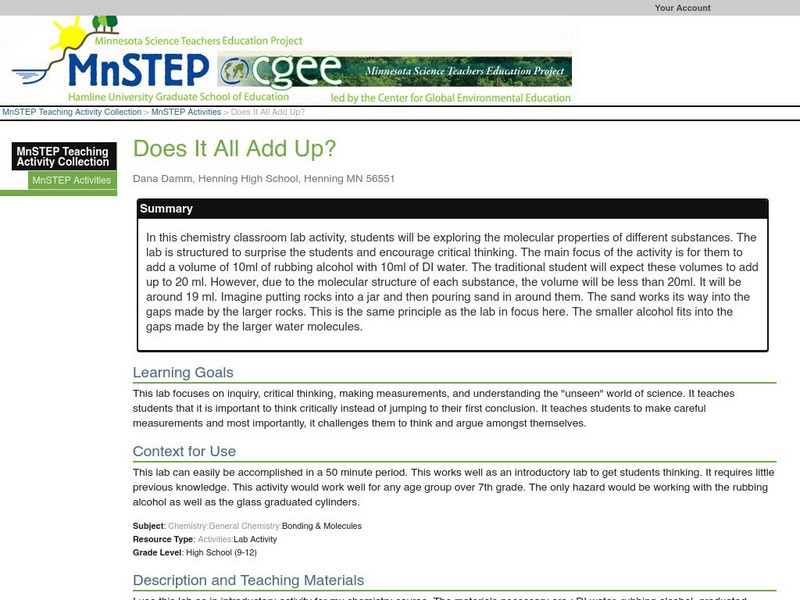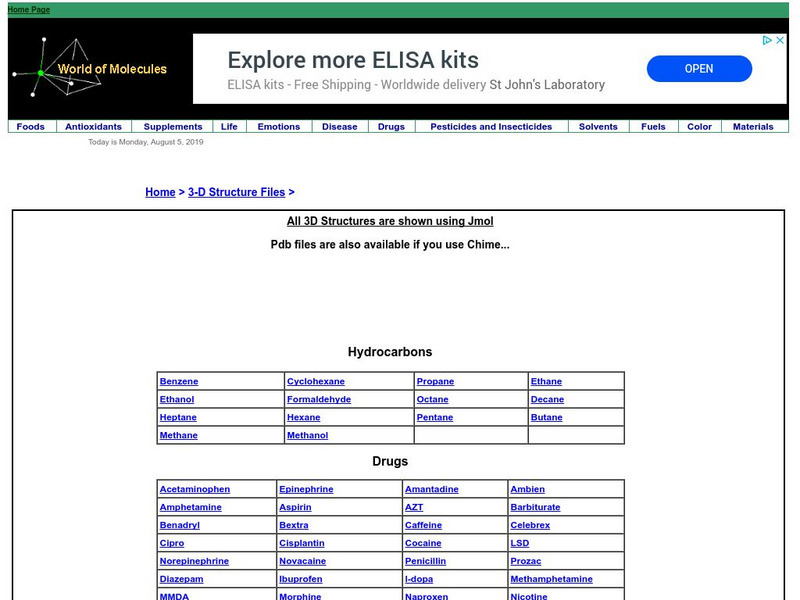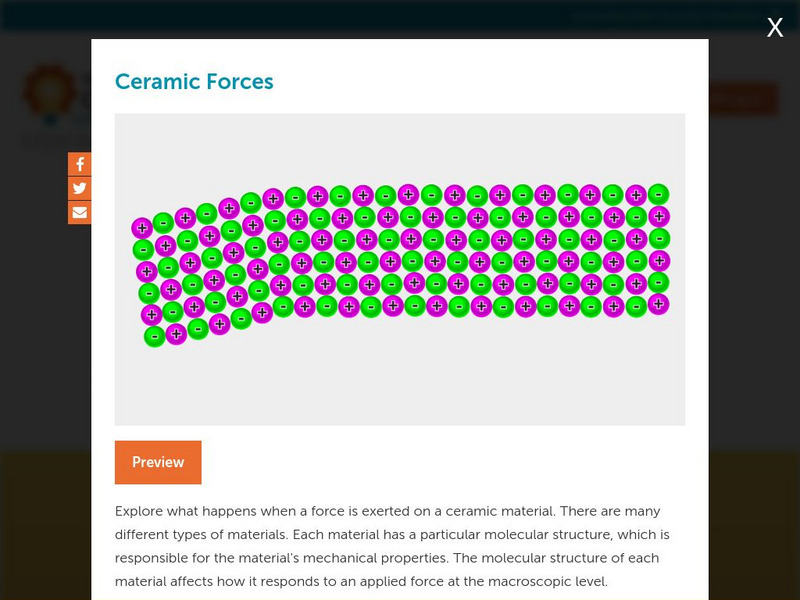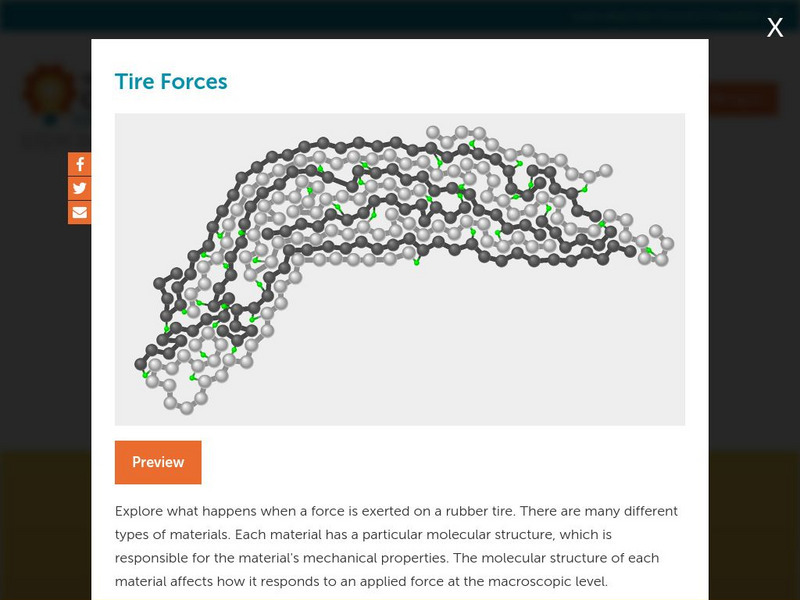Chiral Publishing
Chiral Publishing: An Introduction to Chemistry: Molecular Structure [Pdf]
The Molecular Structure chapter from "An Introduction to Chemistry" textbook discusses the formation of covalent bonds, drawing Lewis dot structures, and the resonance and molecular geometry of molecules. Many pictures and examples are...
Wisc-Online
Wisc Online: Lewis Dot Structures of Covalent Compounds
Short slide show provides basic information about drawing Lewis dot structures for covalent compounds. Starts with anatomy of the atom, and then shows the relationship between atomic particles and the Periodic Table of Elements. Offers...
Simon Fraser University
Chem1 Virtual Textbook: Molecules and the Properties of Bonded Atoms
College-level site goes into great detail about chemical bonding properties, as far as energies, structure, angles, and length. Infrared absorption, the greenhouse effect, and global warming are addressed to exemplify bond length...
Concord Consortium
Concord Consortium: Stem Resources: Tire Forces
Explore what happens when a force is exerted on a rubber tire with many different types of materials.
Chiral Publishing
Chiral Publishing: An Introduction to Chemistry: Molecular Structure: Study Guide [Pdf]
This study guide covers the molecular structure chapter from "An Introduction to Chemistry". Includes chapter goals, map, checklist, and web resources. Also find detailed answers to the chapter review questions.
Chiral Publishing
Chiral Publishing: An Introduction to Chemistry: Molecular Structure: Power Point [Pdf]
This power point covers the molecular structure chapter from "An Introduction to Chemistry". It reviews the main ideas and shows many examples of covalent bonding from valence electrons. Also includes detailed steps to drawing lewis dot...
Chiral Publishing
Chiral Publishing: An Introduction to Chemistry: Molecular Structures: Nonmetals
Discover the molecular structure of some common nonmetals with these three-dimensional pictures. Look at the models from all angles by manipulating the elements.
University of Arizona
University of Arizona: Using Computers to Study Molecular Structure
The main objective for this exercise is to enhance your study of the properties and structures of biological molecules with modern computer graphics. Rather than passively viewing illustrations of molecular structure as they occur in...
Science Education Resource Center at Carleton College
Serc: Does It All Add Up?
In this chemistry classroom lab activity, learners use critical thinking to investigate the molecular properties of different liquids: rubbing alcohol and water.
Estrella Mountain Community College
Online Biology Book: Chemistry Ii: Water and Organic Molecules
Online biology textbook discussing the chemical nature of water, and the importance of its molecular structure to life. Also discusses at length the organic molecules nucleic acids, proteins, lipids, and carbohydrates.
Concord Consortium
Concord Consortium: Molecular Workbench:an Introduction to X Ray Crystallography
Investigate how we can learn about molecular structure using x-ray crystallography in this module.
Other
Science Alive: Synthetic vs. Natural: What's the Difference?
Through this reading, learners will learn that a substance's properties arise from its molecular structure, not from how it's made (i.e., synthesized by people or found in nature). There is no fundamental difference between natural and...
Other
World of Molecules: 3 D Structure Files
Investigate the three-dimensional structure of various molecules- both organic and inorganic.
State University of New York
State University of New York: Determining Molecular Shapes
In the following activity, students are required to select a central atom, drag an electron-pair geometry and other appropriate atoms in order to create the molecular structure.
State University of New York
State University of New York: Boiling Points of Simple Organic Compounds
This simulation explores the effects of molecular structure on normal boiling points for a series of related organic compounds.
Other
Beautiful Chemistry: Beautiful Structures: Crystals of Nanocrystals
A display of crystals of nanocrystals allows students to study the inner structure and components of these structures. Being able to precisely control the shape and size of nanocrystals and understand their self-assembly process might...
Other
Beautiful Chemistry: Beautiful Structures: Quasicrystals
An interactive display of quasicrystals allows students to study the inner components and molecular make-up of these structures. Since the discovery of quasicrystals, a lot of efforts have been put on finding the locations of atoms...
National Health Museum
Nhm: Amino Acid Sequences Show Evolution
This lesson plan focuses on differences in the amino acid sequence of hemoglobin and myoglobin proteins. They use the number of differences to create a phylogenetic tree.
National Health Museum
Access Excellence: Molecular Biology/primate Phylogeny
This lesson plan involves comparison of amino acids to create a phylogenetic tree of primates. Students will also use other species information to draw conclusions about evolutionary relationships.
Museum of Science
The Atom's Family: Mighty Molecules
In this activity, students construct models of molecules using marshmallows and gum drops.
Other
Beautiful Chemistry: Molecular Structures
These models show the structures of some basic molecules such as water and carbon dioxide, then move on to show more complex molecular strautures.
Other
Beautiful Chemistry: Beautiful Structures: Gas and Liquid
In Beautiful Chemistry, we talk about crystals, quasicrystals and glasses, which are all solids. Here, we see the molecular structure of gases and liquids.
Concord Consortium
Concord Consortium: Ceramic Forces
Explore what happens when a force is exerted on a ceramic material. The molecular structure of the material affects how it responds to an applied force at the macroscopic level.
Concord Consortium
Concord Consortium: Tire Forces
Explore what happens when a force is exerted on a rubber tire. The molecular structure of each material affects how it responds to an applied force at the macroscopic level.


![Chiral Publishing: An Introduction to Chemistry: Molecular Structure [Pdf] eBook Chiral Publishing: An Introduction to Chemistry: Molecular Structure [Pdf] eBook](https://d15y2dacu3jp90.cloudfront.net/images/attachment_defaults/resource/large/FPO-knovation.png)

